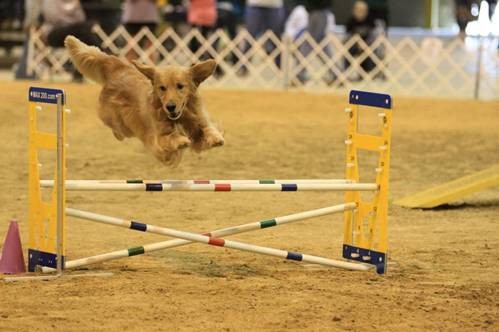April 5, 2018 – Davy was a healthy 9-year-old golden retriever with an important mission - bringing love to those in need. A therapy dog, Davy brought his special brand of cheer to hospital patients, and snuggled next to young students at school as they read him books. He loved every moment of his work and took his jobs seriously, making a difference in the world with his furry presence.
 But one day, Davy’s owner, Carol Everetts, noticed something wrong. The zing in Davy’s step had gone. A visit to her veterinarian revealed Davy had hemangiosarcoma, a deadly canine cancer.
But one day, Davy’s owner, Carol Everetts, noticed something wrong. The zing in Davy’s step had gone. A visit to her veterinarian revealed Davy had hemangiosarcoma, a deadly canine cancer.
Hemangiosarcoma is a particularly malicious cancer. Your dog may seem perfectly healthy one day and the next you are rushing off to your veterinarian to see why your dog is suddenly so sick. The cancer is particularly devastating because the growing tumor can rupture, causing rapid and significant blood loss, which often is fatal. Some dogs exhibit no signs of disease prior to tumor rupture. Others can have subtle clinical signs, such as lethargy and weakness, that may go unnoticed by owners.
Davy immediately underwent surgery and veterinarians removed a softball-sized tumor from his liver. Carol was given the grim news that Davy would likely live an additional two to three months following surgery. Davy defied the odds. Ten months later, Carol still was taking him to visit hospital patients. But she knew the gravity of this cancer and knew it would come back with a vengeance.
“Davy continued to do therapy work while in recovery. I think this gave him a purpose,” said Carol. “One day, we went to a hospital and I thought I shouldn’t take him and should let him rest. But once we got there he was so enthusiastic. Davy was wagging his tail and getting petted right and left. He was trying to cheer up the patients that were as sick as he was. He was a champion.”
To advance the treatment of hemangiosarcoma, research is desperately needed. Morris Animal Foundation is working to make that happen. In 2018, the Foundation is funding three new hemangiosarcoma studies including:
- Blocking hemangiosarcoma tumor growth
- Exploring a new cancer drug improving post-diagnostic survival of dogs with hemangiosarcoma
- Determining if common heart medications are effective adjunct therapies for hemangiosarcoma
Carol is a longtime donor to Morris Animal Foundation and found out about our work while searching for specific information on health problems affecting her pets. Her first therapy dog, Dizney, had juvenile cataracts and the Foundation was supporting research on cataracts.
“Your Foundation is known for helping all animals and we recognize that your work supports so many diseases and health problems, including the cancers that affect so many animals,” said Carol.
Carol and her husband, Dan, became study sponsors of this research and continue to be donors today, honoring Dizney on through our Tribute Program and honoring the great work of their veterinarian through a gift to the Foundation. And she and her dogs continue helping people in their community.
“My first therapy dog Dizney taught me how to do therapy work,” said Carol. “Dizney would carry his leash in his mouth and then look back to make sure I was coming along. Dizney also was instrumental in training our next golden retriever Dandy who carried on Dizney’s work after Dizney passed away from lymphoma. And then Dandy helped train Davy.”
Dandy and Davy passed away a few months from each other. Dandy lived to the ripe old age of 15 ½, passing away from congestive heart failure, and Davy had just turned 10 when hemangiosarcoma finally took him. A new generation of goldens carries on the important work of the Everett therapy dogs, Dickens, 3, and Dino, 7.
“My dogs are my happy pills,” said Carol. “They bring me and everyone who meets them joy, and their enthusiasm for life is contagious. It’s important to me to keep them as healthy as possible.”




